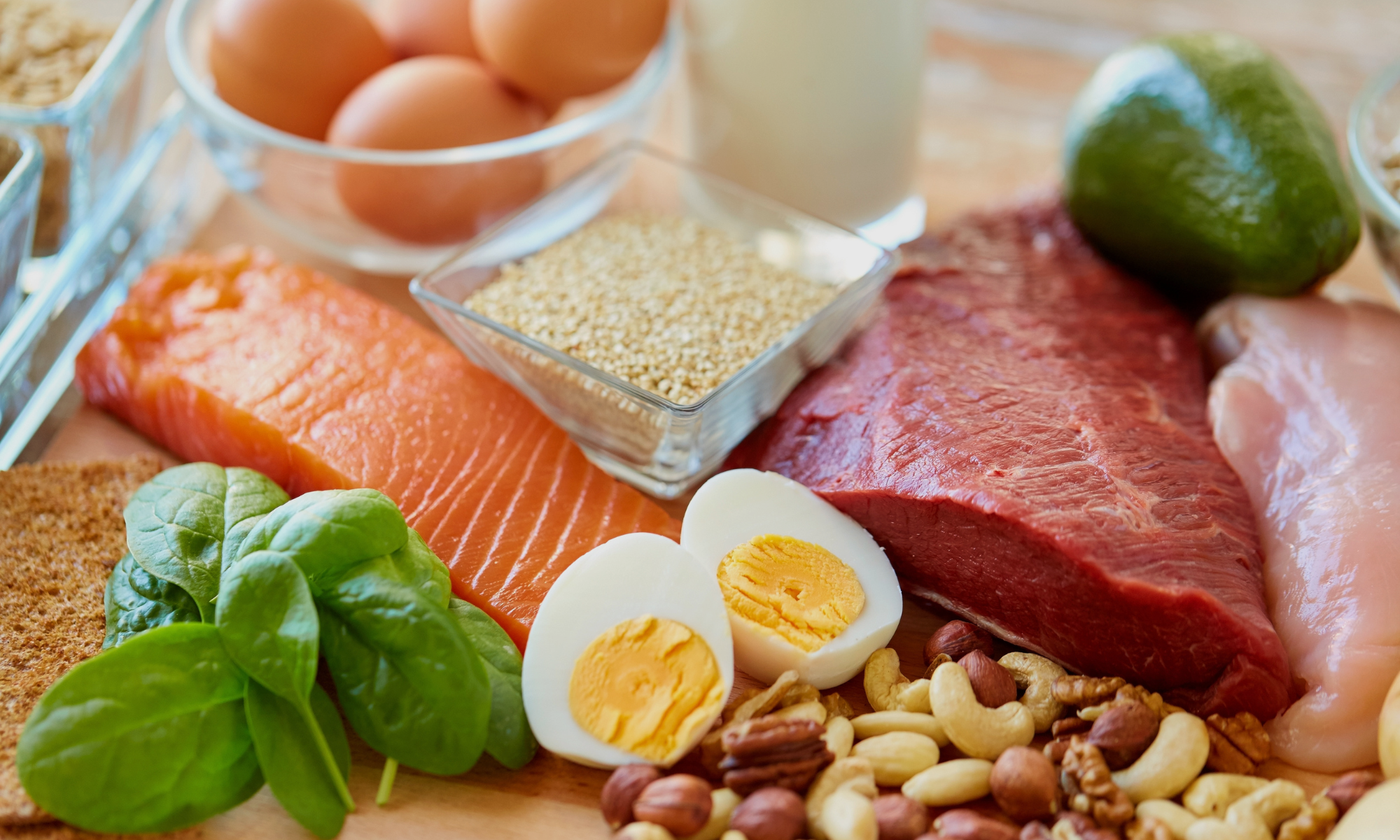Top 13 Benefits of a High-Protein Diet

KEY TAKEAWAYS
- A high-protein diet curbs appetite and reduces cravings, often leading to significantly lower daily calorie intake without intentional restriction.
- Higher protein intake makes weight loss easier and more effective, enabling you to lose more fat while preserving lean muscle mass for a healthier body composition.
- Protein is essential for building and maintaining muscle and bone – getting enough helps increase muscle strength, protect bone density, and prevent age-related muscle loss or osteoporosis.
- High-protein diets can boost metabolism and stabilize blood sugar levels, meaning you burn a few more calories per day and experience fewer blood sugar spikes and crashes.
- Many vital body functions depend on protein, from a strong immune system and fast wound healing to healthy hair/skin/nails and the production of mood-regulating brain chemicals – underscoring protein’s role in overall wellness.
Research shows that increasing protein intake to around 30% of daily calories can lead to consuming 441 fewer calories per day and losing an average of 11 pounds in 12 weeks. This data-backed result highlights just one of the many science-driven advantages of a high-protein diet. Protein not only helps control appetite and weight, but also fuels muscle growth, supports metabolic health, and contributes to overall vitality.
What is Protein?

Protein is one of the three essential macronutrients (alongside carbohydrates and fats) that our bodies rely on for energy and structure. It’s composed of amino acids, which are often called the “building blocks” of life. There are 20 different amino acids, and nine of them are considered essential amino acids – meaning we must get them from food because our bodies can’t make them. When you eat protein, your body breaks it down into these amino acids, which are then used to build and repair tissues, make enzymes and hormones, and support countless other bodily functions.
In practical terms, protein is the major structural component of muscles, bones, skin, hair, and nails. It also plays a key role in immune function (forming antibodies), in transporting oxygen (as part of hemoglobin), and in blood sugar regulation (via certain hormones). Because protein is involved in nearly every process in the body, getting enough in your diet is essential for overall health. Most adults are advised to consume at least 0.8 grams of protein per kilogram of body weight per day, but a “high-protein” diet typically involves significantly more – often 1.2–1.6 g/kg or around 25-30% of one’s calories from protein – to fully capitalize on its benefits.
In one study, people who increased their protein intake to 30% of calories automatically ate 441 fewer calories per day and lost 11 pounds in 12 weeks.
Benefits of a High-Protein Diet
Below are 13 science-backed benefits of adopting a high-protein diet, each illustrating how protein can positively impact your health and well-being:
1. Appetite Reduction and Satiety

Tame your hunger by prioritizing protein at meals. High-protein foods are extremely filling – protein is the most satiating macronutrient, meaning it curbs your appetite more effectively than carbs or fats. Eating more protein increases the release of fullness hormones (like peptide YY and GLP-1) while reducing levels of ghrelin, the hunger hormone. In practice, this translates to fewer cravings and less snacking. One study found that boosting protein to 25% of daily calories reduced cravings by 60% and cut the desire for late-night snacking in half. This appetite-satisfying effect can lead to naturally eating fewer calories overall, making weight control much easier.
2. Weight Management
Manage your weight more effectively with a protein-rich diet. Because protein keeps you fuller longer and slightly boosts your metabolism (more on that later), it creates an ideal scenario for weight loss and maintenance. People who increase their protein intake often find they automatically consume fewer calories in a day without feeling deprived. For instance, in one 12-week study, participants who raised protein to ~30% of their calories ended up eating 441 fewer calories per day and lost about 11 pounds (5 kg) without intentionally restricting anything else. High-protein diets are also great for preventing weight regain after weight loss – they help you feel satisfied and maintain muscle mass, so your body burns more calories at rest. In short, prioritizing protein can make sustainable weight loss (and keeping it off) much more achievable.
3. Muscle Growth and Maintenance
Fuel your muscles with protein to grow stronger and leaner. Muscle tissue is made predominantly of protein, so it’s no surprise that you need ample dietary protein to build and repair muscles. Whether you’re an athlete aiming to gain muscle or someone trying to preserve muscle while losing fat, a high-protein diet is crucial. Consuming protein (especially alongside resistance exercise) stimulates muscle protein synthesis – the process of repairing and building muscle fibers – leading to greater muscle growth over time.
On the flip side, inadequate protein can cause muscle loss and weakness. Research shows that during weight loss, people who eat higher protein lose significantly less muscle and more fat than those on lower-protein diets. In one trial, two groups lost the same amount of weight on different protein intakes, but the high-protein group maintained all their lean muscle while the standard-protein group lost some muscle. The takeaway: eating enough protein helps you develop strong muscles and prevents muscle breakdown, keeping you physically stronger and more toned.
4. Bone Health
Build stronger bones by getting sufficient protein. While calcium and vitamin D are often touted for bone health, protein is equally important for maintaining a robust skeleton. Proteins form roughly one-third of bone mass and help create the collagen matrix that minerals like calcium attach to, giving bones their structure. Higher protein intake has been linked to better bone density and a lower risk of fractures, especially in older adults. In a large study, seniors who ate more protein (at least 15% of their calories) had 1.8–6% higher bone density in their hips and spine and a significantly lower risk of fractures than those eating less. In fact, getting more protein was associated with up to a 36–65% reduction in risk of vertebral fractures over 5 years. By including plenty of protein in your diet, you provide your bones with the materials they need to stay dense and strong, helping to prevent osteoporosis and injuries as you age.
5. Lower Blood Pressure

Support heart health and lower your blood pressure by eating more protein. High blood pressure (hypertension) is a major risk factor for heart disease, and diet plays a key role in managing it. Emerging research suggests that higher protein diets may help keep blood pressure in check. Protein, especially from plant sources and lean dairy, contains bioactive peptides that promote healthier blood vessels and improve nitric oxide production, which relaxes arteries. Additionally, replacing some refined carbs in your diet with protein can aid weight loss and insulin sensitivity – both of which indirectly benefit blood pressure.
A long-term observational study of over 77,000 adults found that people with the highest protein intake (roughly 100+ grams per day) had a 40% lower risk of developing high blood pressure compared to those with low protein intake. The effect was seen with protein from both animal and plant sources, and it was even more pronounced when high protein intake was combined with a high-fiber diet. While protein isn’t a replacement for other healthy habits (like reducing excess salt), it can be an important part of a blood pressure-friendly diet.
6. Enhanced Recovery and Healing
Accelerate your body’s recovery and healing processes with protein. After an intense workout, an injury, or surgery, your body’s demand for protein increases significantly. That’s because protein provides the raw amino acids needed to repair damaged tissues, heal wounds, and regenerate cells. From fixing tiny muscle tears caused by exercise to healing a surgical incision, protein is at the center of rebuilding. If you skimp on protein during recovery, you may heal slower and lose valuable muscle mass. In fact, experts often recommend increasing protein intake to 1.5–3.0 grams per kilogram of body weight per day during major recovery periods to support healing and prevent muscle loss (much higher than the normal minimum of 0.8 g/kg). A high-protein diet after injury can aid collagen synthesis for wound closure, new capillary growth, and tissue remodeling. The measurable payoff is faster healing and less time sidelined. Whether you’re bouncing back from a tough gym session or a physical injury, protein helps you recover faster and come back stronger.
7. Metabolic Boost
Give your metabolism a natural boost by eating more protein. One lesser-known benefit of protein is its high thermic effect – basically, your body burns more calories digesting protein than it does digesting carbs or fat. Approximately 25–30% of protein’s calories are used up just to digest and process it, whereas only about 6–8% of carbohydrate calories and 2–3% of fat calories are burned through digestion. This means a high-protein meal effectively delivers fewer net calories than a high-carb meal of the same total calories.
Over the course of a day, this effect adds up: studies show that high-protein diets can increase your daily energy expenditure by about 80–100 calories compared to lower-protein diets. Beyond digestion, protein also helps maintain lean muscle mass, which keeps your resting metabolic rate higher (muscle burns more calories at rest than fat does). In simple terms, protein has a metabolic advantage – it nudges your body to burn a bit more energy each day. While 100 extra calories per day might sound small, over weeks and months it can contribute to easier weight management. Think of a high-protein diet as stoking your inner calorie-burning fire, just a little hotter.
8. Immune System Support

Strengthen your immune defenses with adequate protein. All of the cells and antibodies in your immune system are made from proteins. If you don’t get enough protein in your diet, your body struggles to produce immune cells and molecules that fight off viruses and bacteria. Protein malnutrition is known to impair immune function – for example, severe protein deficiency is associated with higher infection rates and poor wound healing.
On the flip side, a high-protein diet provides plentiful amino acids like glutamine and arginine that are crucial for fueling immune cells and producing antibodies. In practical terms, this means your immune system can respond faster and more effectively to threats. You might notice you get sick less often, and when you do catch a cold or minor infection, your recovery could be quicker. From the antibodies that neutralize pathogens to the enzymes that support detoxification, protein is involved at every level of immunity. Ensuring you meet your protein needs is a simple way to arm your body’s natural defense system and stay healthier year-round.
9. Improved Body Composition
Sculpt a leaner body composition by upping your protein intake. Body composition refers to the ratio of lean mass (muscles, bones, etc.) to fat mass in your body. A high-protein diet can help shift this ratio in a favorable direction – more muscle, less fat. Even if two people eat the same number of calories, the one with more protein is likely to lose more fat and retain (or even gain) more lean muscle. For example, in a 12-month trial, overweight participants who ate a high-protein diet (30% of calories, ~1.3 g/kg) lost significantly more body fat and less lean mass than those who ate a standard protein diet (15% of calories).
Protein basically tells your body “hang on to muscle, burn fat instead.” The result is that weight lost on a high-protein plan tends to come predominantly from fat stores, not muscle tissue. Moreover, if you’re strength training, the extra protein will support muscle growth, further improving your body composition. Over time, this leads to a visibly leaner, tighter physique, a higher percentage of your weight is healthy lean mass. For anyone looking to tone up or change their body shape, protein is your best friend.
10. Blood Sugar Regulation
Keep blood sugar levels stable by choosing protein over excess carbs. Unlike sugary or starchy foods, pure protein doesn’t cause spikes in blood glucose. In fact, eating protein with your meals helps slow down the absorption of carbohydrates, resulting in a steadier rise in blood sugar rather than a sharp spike. This is great news for energy levels (no more rollercoaster crashes) and for long-term health, especially in people at risk of diabetes.
High-protein diets have shown real benefits for blood sugar control: in a clinical study on individuals with type 2 diabetes, those who followed a 30% protein diet for 5 weeks saw a 40% decrease in 24-hour blood glucose levels compared to when they ate a higher-carb diet. Their hemoglobin A1c (a marker of long-term blood sugar) also improved significantly. Even if you don’t have diabetes, the message is clear – swapping some refined carbs for protein (think choosing grilled chicken and veggies over pasta, for example) will lead to smaller post-meal glucose swings. This can translate to more consistent energy throughout the day and may reduce the risk of developing insulin resistance. In short, protein helps steady your blood sugar, which benefits your metabolism and how you feel day-to-day.
11. Energy and Stamina
Enjoy more consistent energy and endurance by fueling with protein. If you often experience midday fatigue or energy crashes, protein could be the nutrient you’re missing. High-protein foods provide a slow, steady release of energy because they take longer to digest than quick carbs. By slowing digestion, protein helps prevent the rapid blood sugar spikes and drops that can leave you feeling drained. Additionally, getting enough protein ensures your body isn’t forced to break down muscle tissue for energy, which can happen if you’re under-eating protein, that muscle loss can lead to weakness and lower stamina over time.
In contrast, a protein-rich diet supports better endurance by preserving muscle strength. It’s telling that one of the first signs of protein deficiency is fatigue and weakness. Many people report feeling more energetic and alert when they increase their protein intake, likely due to more stable blood sugar and improved overall nutrition. While protein itself isn’t a stimulant, it creates the conditions for sustained energy. So, replacing that mid-afternoon sugary snack with a protein-packed option (like Greek yogurt or nuts) may help you power through the day without the crash. Consistent protein at each meal = more steady, long-lasting energy.
12. Hair, Skin, and Nail Health
Nourish your hair, skin, and nails with ample protein. If you want healthy hair, strong nails, and glowing skin, protein is a must-have in your diet. These tissues are literally made of protein: hair and nails are composed mostly of a tough protein called keratin, and your skin’s structure relies on collagen (the most abundant protein in the body). In fact, about 95% of each strand of hair is pure protein. When you don’t eat enough protein, these parts of your body suffer – you might notice your hair becoming dry or thinning, your nails becoming brittle, or your skin getting dull and prone to injury or slow healing. On the flip side, a high-protein diet supplies the amino acids needed to produce new keratin, collagen, and elastin fibers.
This means faster-growing, stronger hair and nails, and skin that can repair and regenerate efficiently. For example, collagen (from protein) helps keep skin elastic and youthful, while keratin strengthens hair shafts to prevent breakage. You’ll often see protein shakes or bars marketed for beauty, but you can get the same benefits by simply eating protein-rich whole foods. Over time, you may see tangible improvements: fuller hair, sturdier nails, and skin that looks healthier. Essentially, protein works from the inside out to support your natural beauty.
13. Mood and Cognitive Function

Boost your mood and brainpower with a high-protein diet. There’s a strong connection between what you eat and how your brain functions. Protein plays a direct role in this by providing amino acids that are precursors to important neurotransmitters in the brain. For example, the amino acid tryptophan (found in protein foods like turkey, eggs, etc.) is used to produce serotonin, a neurotransmitter that regulates mood and feelings of well-being. Tyrosine, another amino acid from protein, is needed for dopamine production, which influences motivation and focus. If your diet is very low in protein, you might not get enough of these key amino acids, potentially leading to mood changes, increased anxiety, or difficulty concentrating. On the other hand, eating sufficient protein can help stabilize your mood and improve mental clarity.
Additionally, protein-rich foods often contain vitamins and minerals (like B-vitamins, iron, and zinc) that support cognitive function. Over the long term, a higher protein intake may even be protective for your brain: a Harvard study following 77,000+ people over 20 years found that replacing some carbohydrates with protein was associated with significantly lower risk of cognitive decline and dementia – for every 5% of calories swapped in favor of protein, participants’ risk of dementia dropped by 11% (and by 26% when the protein was plant-based). While more research is needed, it’s clear that protein is not just for muscles – it’s also fuel for your brain, helping you feel sharper, more focused, and in a better mood.
Protein is as important for your mental well-being as it is for your physical health, providing the amino acids that build not just muscle, but also mood-regulating brain chemicals.
High-Protein Foods to Start Eating

One of the best ways to enjoy the benefits above is to incorporate a variety of protein-rich foods into your daily diet. By choosing nutrient-dense sources of protein, you’ll not only boost your protein intake but also get plenty of vitamins, minerals, and other healthful nutrients. Here are some excellent high-protein foods to consider adding to your meals:
-
Eggs: A fantastic complete protein, each large egg provides about 6 grams of high-quality protein. Eggs are rich in essential amino acids and also come packed with beneficial nutrients like choline (important for brain health) and vitamin D. Starting your day with eggs can keep you full and energized, and their protein supports muscle maintenance and repair.
-
Skinless Chicken Breast: Chicken breast is a lean protein superstar – a typical serving (3–4 ounces cooked) delivers around 25–30 grams of protein with minimal fat. It’s an excellent source of B vitamins and minerals like selenium as well. Including chicken or other lean poultry in your diet supports muscle growth and weight management, all while being versatile enough to use in countless recipes.
-
Salmon (and Other Fish): Fatty fish like salmon offers about 22–25 grams of protein per 3-4 ounce filet, along with heart-healthy omega-3 fatty acids. Salmon is also rich in B12 and vitamin D. Eating fish provides high-quality protein that promotes muscle maintenance, and the omega-3s help reduce inflammation and support brain and heart health. Lighter fish (like cod or tilapia) have slightly less fat but still plenty of protein (about 20g per 3 oz).
-
Greek Yogurt: This thick, creamy yogurt is strained to be extra rich in protein – a 6-ounce (170g) container of plain Greek yogurt typically contains 15–17 grams of protein. It’s also a great source of calcium for your bones and probiotics for gut health. Greek yogurt makes an easy high-protein breakfast or snack (try it with fruit or nuts), helping with muscle recovery and keeping you full between meals.
-
Lentils: Lentils are a powerhouse plant protein, providing roughly 18 grams of protein per cooked cup. Along with that protein, you get a hefty dose of fiber, iron, folate, and antioxidants. Lentils (and their legume cousins like black beans and chickpeas) support muscle health and digestion at the same time. They’re perfect for soups, stews, or salads and are an affordable way to boost protein intake, especially for vegetarians and vegans.
-
Tofu (and Tempeh): Made from soybeans, tofu is an excellent meat-free protein source with about 10 grams of protein in a 1/2 cup (approx. 85g) serving of firm tofu. It contains all essential amino acids, making it a complete plant protein. Tofu is also rich in minerals like calcium and magnesium. Whether you stir-fry it, grill it, or add it to smoothies, tofu can help support muscle maintenance and heart health (soy protein has been linked to lower LDL cholesterol). Tempeh, another soy product, is even higher in protein (about 15g per 1/2 cup) and offers probiotics due to fermentation.
-
Quinoa: Often called a “pseudo-grain,” quinoa is one of the few grains that is relatively high in protein. One cup of cooked quinoa provides around 8 grams of protein along with lots of fiber, magnesium, and iron. Quinoa is a complete protein (containing all essential amino acids), and while its protein amount is moderate, it’s a fantastic base for high-protein meals – for example, you can mix quinoa with beans, chicken, or tofu to easily increase total protein. It’s also gluten-free and gentle on blood sugar, making it a great carbohydrate choice to pair with other proteins.
By incorporating a variety of these protein-rich foods into your diet, you can easily ramp up your protein intake and enjoy the health benefits that come with it. Remember, variety is key – combining animal and plant protein sources will ensure you get a broad spectrum of amino acids and nutrients. Whether it’s eggs for breakfast, a lentil salad for lunch, or grilled fish for dinner, making protein a focal point of each meal is a smart strategy for holistic health.
At Roots Nutrition, we champion a holistic approach to wellness, because true health is about nourishing both your body and mind. Embracing a high-protein diet is just one example of how a simple nutritional tweak can lead to significant improvements in how you feel and function each day. We also recognize that everyone’s needs are unique: the optimal diet for you is one that fits your lifestyle, goals, and biology. That’s why Roots Nutrition offers personalized wellness solutions to help you find the right balance, whether it’s incorporating more protein or any other adjustments for better health. By focusing on whole, nutrient-dense foods and tailoring our guidance to you, we aim to empower your health journey. Protein might be the spotlight in this discussion, but vibrant health comes from an array of good habits – and we’re here to support you in every step toward an optimal, nourished life.
Common Questions About Benefits of a High-Protein Diet
How much protein is considered a “high-protein” diet?
It generally means getting around 25–30% of your daily calories from protein. In practical terms, that’s roughly 1.2 to 1.6 grams of protein per kilogram of body weight for most adults. This is higher than the standard RDA (0.8 g/kg), and for a 150-pound person equates to about 82–109 grams of protein per day as part of a high-protein regimen.
Can a high-protein diet help you lose weight?
Yes, a high-protein diet is well-known to aid weight loss. Protein naturally reduces hunger and prevents overeating by keeping you full longer, and it also slightly boosts your metabolism. Many studies have found that people on high-protein diets lose more weight (and specifically more body fat) than those on lower-protein diets – even when eating the same number of calories – because they tend to eat fewer calories overall and preserve more lean muscle.
Do high-protein diets harm your kidneys?
For healthy individuals, there is no good evidence that a high-protein diet causes kidney damage. The kidneys are very efficient at processing protein byproducts in people without pre-existing kidney disease. However, if you do have chronic kidney issues, you may need to moderate your protein intake according to medical advice. In summary, high-protein diets are generally safe for most people, but those with kidney disease should consult their doctor or dietitian for personalized guidance.
How can vegetarians or vegans follow a high-protein diet?
Vegetarians and vegans can absolutely get plenty of protein by focusing on plant-based protein sources. Legumes (beans, lentils, chickpeas), tofu and tempeh, edamame, seitan, quinoa, nuts and seeds, and high-protein whole grains are all excellent options. For example, combining foods like beans with rice or hummus with whole-grain pita creates complete protein profiles. Many plant foods are protein-rich – a cup of lentils has ~18g, a cup of cooked quinoa ~8g, 2 tablespoons of peanut butter ~8g – so by including these in each meal, those avoiding meat can still easily reach a high-protein intake. (Lacto-ovo vegetarians can also include eggs and dairy like Greek yogurt for an extra protein boost.)
Will eating more protein build muscle even if I don’t exercise?
Eating sufficient protein will help maintain your muscle mass, but building new muscle largely requires resistance exercise (strength training). Protein provides the raw materials (amino acids) for muscle repair and growth, so it’s most effective when paired with exercise that stimulates the muscles. In other words, a high-protein diet will ensure your body can repair and grow muscle fibers, but you still need the stimulus of weightlifting or resistance workouts to trigger significant muscle growth. Without exercise, extra protein won’t magically turn into extra muscle – though it will help prevent muscle loss during dieting or inactivity.
For those seeking a more personalized approach to digestive health and overall wellness, Roots Nutrition offers expert-curated supplement packages tailored to your unique needs. Founded by Dr. Romeo Brooks, a pioneer in holistic health, Roots Nutrition combines decades of expertise in natural healing with scientifically-backed solutions. Discover how our natural supplements can support optimal digestion, detoxification, and vitality—empowering you to achieve your health goals.





